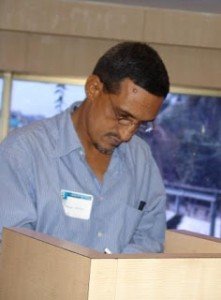[featured_image]
Dr. Jesudas M. Athyal, from the Gurukul Lutheran Theological College in Chennai, India, taught on various dimensions of the Indian society. It was very insightful as he explained the social-religious aspects of the culture, including politics, economics, religion and the urban-rural context.
He explained how the process of urbanization was bringing rapid change to India. Sometime in 2007 or 2008, the majority of the world’s population will have shifted from rural to urban. The world (not just India) will be dominantly urban. This has huge ramifications for ministry and mission.
Dr. Athyal believes that it is important to sensitize students here in India to the main problems of Indian society, to develop their understanding of the causes and ramifications of these problems, and to foster their capacity to evaluate the relevance of different approaches to tackle these problems. His students are expected to be able to:
- Be sensitive to the context of the society in which they are called to serve.
- Be able to understand the socio-economic structures which form the basic ingredient of the society.
- Be able to understand the dialectical relationship between faith and society whereby while the faith community develops a deeper understanding of the socio-economic realities, the presence of the faith community in social movements in turn would impart a faith dimension to these movements.
- Be able to connect the Scripture to the present day problems and prospects of the society.
- Be able to learn from field study – i.e., to be exposed to the lived experience, notably among the urban poor such as slums.
In listening to him lecture and reflecting on this list, I began to realize that he is teaching students to exegete the culture where they live and giving them tools to understand how to reach those in the culture incarnationally.
So – if you are committed to missional Christianity and being a missionary wherever you are – how can you apply these principles? How are you exegeting your culture? How are you understanding and engaging the context of the society you are called to serve?



